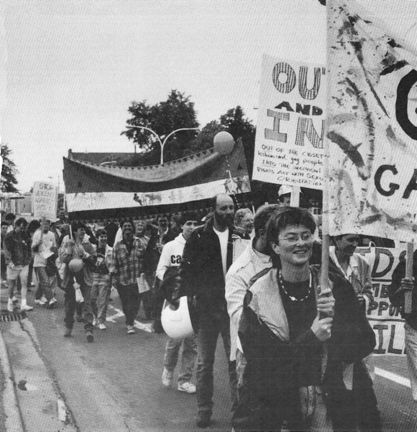HALIFAX — An exhibit at the Spring Garden Road Memorial Public Library reminds us when 75 members of the LGBTQ community marched through downtown Halifax in 1988 there was little to celebrate, and much to fear. But, it would become the annual Halifax Pride Parade, which celebrated its twenty-fifth anniversary this year.
The exhibit consists of a series of panels displaying photographs, notes on context, and quotes by participants of the 1988 march. It paints a picture of a mainstream society where homophobia was the norm.
Chris Aucoin researched and curated the exhibit commissioned by Halifax Pride. Aucoin explains the parade started out as a protest against the violence that LGBTQ people were experiencing.
“For us, violence was part of the 1980s in a very big way,” says Aucoin. “There was no human rights protection. You could lose your job if it was found out that you were queer. You could lose your apartment. You could be denied service in a restaurant.”
Or you could get beaten up, Aucoin adds. He says gay bashing was common and pleas to the authorities went unheard.
A variety of events lead up to the 1988 march. The Gay Alliance for Equality, formally established in 1973, was the first organization in Nova Scotia to fight for gay rights. In 1978 there was a large national conference in Halifax of gay and lesbian activists. About 200 participants marched through Halifax.
But when 1988 arrived things had hardly improved. That was the year Eric Smith, a teacher in Shelburne County, was fired by the school board for having HIV. John William Tha Din was beaten to death in Camp Hill Cemetery, a gay cruising area. And the AIDS crisis further stigmatized anybody who was gay.
So it took a lot of courage to take part in the march. One of the participants said, “I was terrified to be found out. I was kicked out of the Reserve Forces for being gay, and being on probation while on my first civilian job.”
Aucoin explains that things didn't get any better once the march started. “Somebody drove his car into the crowd and laughed about it. People were yelling things from the sidewalk, or pointing their finger as if it was a gun and making shooting sounds. That may not sound like a big deal, but in a context of people getting physically attacked that is very real and threatening.”
The curator had been involved in gay activism in the late eighties. When researching this exhibit, he began to look into what had happened before he came onto the scene.
“In the process of doing that I crossed paths with all kinds of people,” says Aucoin. “People who were brand new to the community with very little knowledge of what transpired before and people who had been involved forever.
“I thought, these people need to talk to each other, to share those stories," Aucoin continues. "I decided to put them in a form and a venue that that can happen."
The exhibit at the Spring Garden Road Memorial Public Library runs until Feb. 24. Robin Metcalfe will give a talk on the significance of Pink Triangle Day on Feb. 12. Chris Aucoin will talk about the exhibit on Feb. 15.




